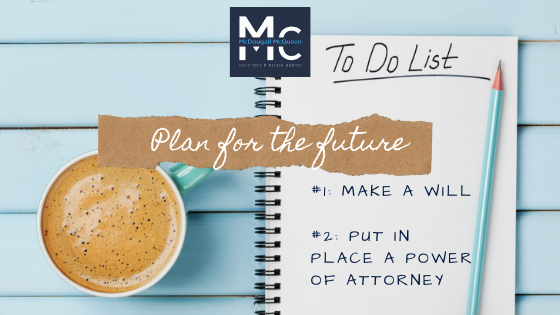
When it comes to New Year’s resolutions, making better choices and planning for your future are normally top of the list. But in addition to the usual tunes of exercising more, eating healthily, and creating more of a work life balance, an important thing that everyone should do is make a Will and put in place a Power of Attorney.
Putting your wishes in black and white is not complicated, nor expensive. Making a Will allows you to express your final wishes clearly, and without one you are leaving it up to the law to decide how your estate (your money, possessions and property) is passed on – and this may not be the way you wanted it. While death, and our treatment until death, can be a difficult topic to think about, it is important to consider making your wishes known now in the event that you cannot make them later.
Some areas to consider:
- Have your circumstances changed recently? Married? Divorced? Kids? Re-married? Make sure your Will is updated when your circumstances do change. If you want a specific family member or friend to take care of your children but that person is not your next of kin, then you need to ensure you designate that person specifically in your will.
- Children – if you have children under 16 you should decide who looks after them and ensure there are funds to help.
- Owner of a small business – without an executor, and if you are a sole director, your business could collapse.
- Non-traditional family? Unmarried couples or not in a civil partnership? In the eyes of the law, a couple who are living together don’t have the same automatic rights as a married couple when it comes to sorting out a deceased person’s estate.
- Property – make sure you know what happens to your house.
- Inheritance Tax – a Will can also help reduce the amount of Inheritance Tax that may be payable on the value of the property and money you leave behind.
- Funeral plans – detail what you want so family members don’t have to make these decisions in difficult circumstances.
- If you die before you take your pension pot, make sure you have nominated someone to collect it for you. If not, it may be up to the pension trustees to determine who gets the money.
A Power of Attorney (POA) is another important legal document that everyone should have. Unlike a Will which is for after you pass away, a POA is for when you are alive. A POA allows you to grant the people you trust ‘power‘ to make important decisions for you if you are unable to do so yourself in the future – this could be due to an illness or accident that leaves you without capacity to make these decisions at the time. Incapacity can happen to any of us, at any time, unexpectedly through illness (such as dementia) or an accident.
Get in touch with McDougall McQueen today to discuss your personal affairs. Don’t leave it too late.
